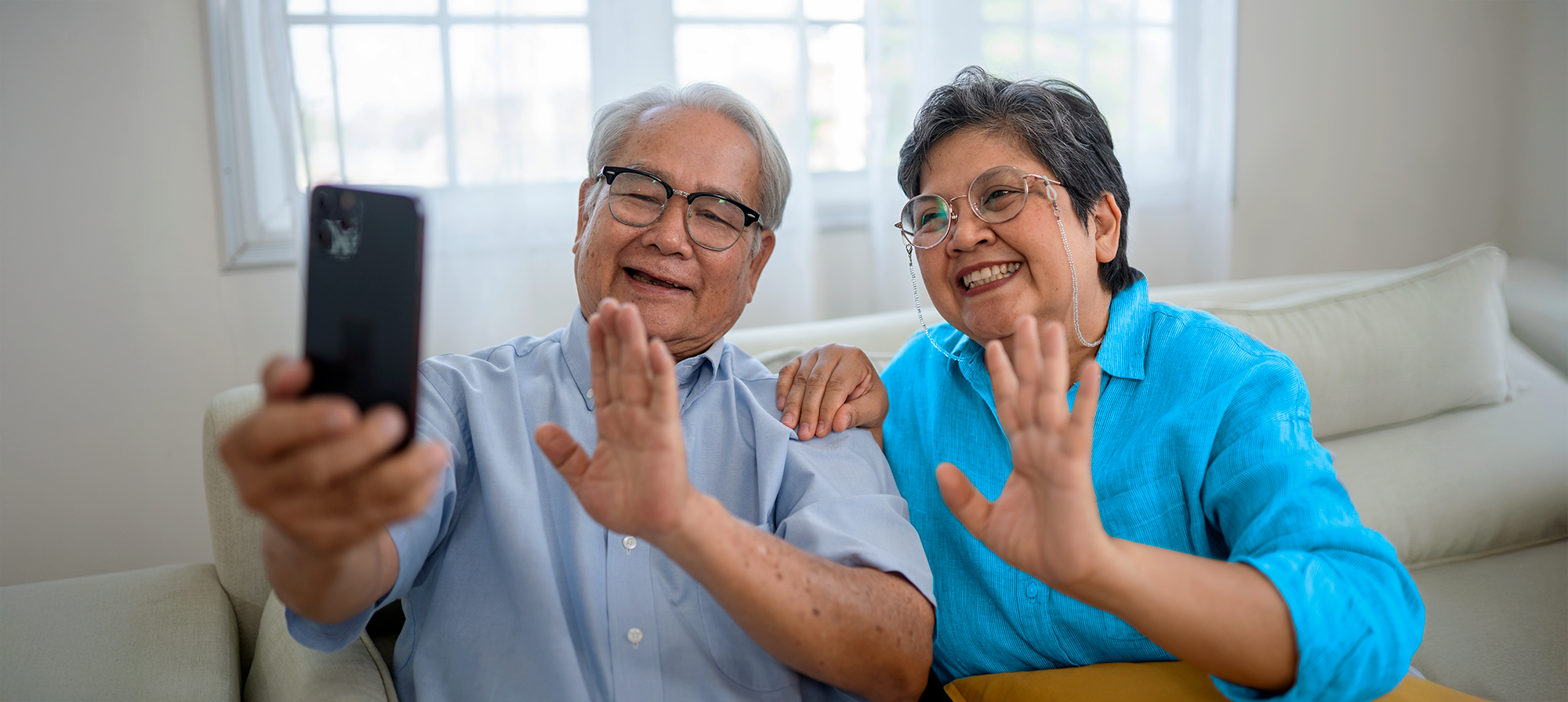Growing older often comes with challenges, including certain changes in health. Some changes are common, but not inevitable. These may include changes in appearance, endurance, strength, mobility, energy, cognitive functioning, and overall health. Health conditions such as diabetes, heart disease, high blood pressure, osteoporosis, and arthritis are more common in older adults, as well.
These changes not only impact your physical health, but can also affect your mental health, emotional well-being, and overall quality of life. You may find yourself longing for the lost vigor of your youth. Or you may feel hopeless in the face of health challenges.
“I just turned 60 this year,” explains Adrian, a homemaker from Syosset, New York. “That was a very huge milestone. While I was in my 50s, I still felt that I was kind of close to my 40s and felt that I was on the young side. But now that I’m in my 60s, even though I just turned 60, I feel like I’m that much closer to 70. So, it really is a wake up, because I feel like my youth is over with and I have to do the best with what I can.”
While feelings like Adrian’s are normal, keep in mind that growing older does not have to be a doom and gloom scenario. You can learn to face your health problems head on.
You can adapt to them and empower yourself to take better control of any chronic conditions you may be living with. You can learn ways to support your health and still live a full, active, and satisfying life.
One way to do that is to cultivate these 3 helpful life skills: acceptance, self-efficacy, and resilience.
How these 3 life skills can help you cope
Like any other kind of skill, life skills are not something you’re born with. They are learned. And you can strengthen them with time and practice—no matter your age.
Here’s how each of these life skills can help you cope with changes in your health, along with some practical steps for strengthening these skills.

1. Acceptance
Adapting to age-related changes starts with learning to recognize and accept those changes that you can’t control. Learning to be at peace with such changes is healthy and empowering. And it can help lessen negative feelings and foster a greater sense of well-being. The more you can accept that some situations are outside your control, the less vulnerable you may feel in those situations.
Say, for example, you’re an avid runner and have been for years. You love running. But, over time, arthritis has developed in your knee. Yet you’re loathe to give up running. So, you push through the pain and doggedly stick with your 5-day a week jogging routine, only to find it worsens the pain and further damages your knee. Learning to accept that you may have to stop running is a critical first step to coping with this kind of challenge.
Accepting such a change is not easy. You may feel frustrated and despondent at the thought of giving up running. You may think running is the only form of exercise you’ll ever enjoy or that helps you stay fit.
Before accepting the situation, it may help to first accept any feelings you have around it. It’s OK to feel sad, frustrated, or helpless in the face of an injury or health challenge. But the point is to not let your feelings get in the way of accepting the situation, as well.
From acceptance springs a greater sense of flexibility, imagination, and a more open mind. Such helpful shifts in thinking can change your perspective of a problem from one that’s unsolvable to one that is solvable—or at least one that you can influence. Acceptance of what you can’t control can help you identify what you can control.

Scott, a 73-year-old former book editor from Spokane, Washington, learned to practice acceptance. He discovered that it opened his mind to a satisfying alternative when a back condition made running too painful.
“I used to run 6 to 8 miles a day…my back has a deteriorating spinal condition that really hurts, just to live. But I can walk. So, I just changed. Now I walk about 6 miles a day. It’s great. I’ve been thinking a lot about this lately, how what you think is going to be intolerable, turns out to be tolerable and even pleasant.”
Here are some practical steps to help you cultivate the skill of acceptance:
- Pinpoint problems you can’t change. It’s not always easy to know which problems you can solve and which you can’t. You can’t control what other people think, say, or do. And you can’t control certain age-related changes to your health. But you can control how you think about, feel about, respond to, and adapt to these problems and events.
- Refuse to be a victim. You may feel more vulnerable to life’s big and small challenges if you always resist or rail against them. Try, instead, to accept them as a normal part of aging. Events like illness, injury, rejection, debt, and even the death of a loved one can happen to anyone at any age. When these events strike, understand that they are not your fault. You are not being punished and you are not a victim.
- Talk it out. A trusted friend or family member may be able to help you reframe a frustrating hurdle or health challenge. That shift may help you learn to accept it. Sometimes, just talking with someone who has gone through something similar can be reassuring and helpful.

Self-efficacy is the belief in your ability to reach goals, complete tasks, or change a habit. And adopting good habits is a key way to cope with changes in health, including many of the chronic conditions that are more common in older age. Self-efficacy serves as the basis for empowerment. When you believe you can do something, you empower yourself to make it happen.
High self-efficacy allows you to see yourself as an agent of change. You believe that, through your actions, you can make things happen.
Say you want to start exercising after living a mostly inactive life. Your doctor says it will help you control your weight and improve your heart health. You know you’ll feel more energetic when you’re with your kids and grandkids. And it will help you feel better about yourself.
But then you wonder when you’ll find the time, energy, or know-how to exercise. You tell yourself you don’t know if you can do it. Or worse, you tell yourself you’re too old to start exercising.
This is where developing stronger self-efficacy can help. Try these tips to strengthen yours:
- Take little steps and savor every success. Break overly ambitious health goals into smaller, more attainable ones. Then track your progress and savor success for each goal met. Multiple successes eventually lead to a sense of mastery, which in turn builds self-efficacy. If you’re trying to jump start that exercise routine, start with a 5-minute walk instead of a 5-mile run.
-
Reflect on past successes; then visualize future ones. You can bolster your self-efficacy when you draw on past success, visualize what future success looks and feels like, and then practice behaviors that support success over time.

Say you got a handle on your junk food habit a few years ago. You’re eating healthier, but you want to take it a step further and add more fresh fruits and veggies to your diet.
Think back on the steps you took to kick your junk food habit and how good it felt to succeed. Maybe you felt healthier? Maybe your mood improved? And maybe you felt more confident in your ability to change an ingrained habit? Now, with that same confidence in mind, apply a similar approach to other health goals you want to achieve.
- Look to role models for inspiration. Have you ever witnessed someone you know accomplish something and thought, “If they can do this, so can I!”? Seeing others succeed who are like you in age and other aspects can help you see that you, too, can succeed. This builds self-efficacy.
Perhaps a friend or loved one has overcome a health challenge similar to your own. Talk with that person about how they accomplished their goal. Or, even better, buddy up with them for workouts, healthy meals, or other health-boosting activities.
“I have a friend in this dance class,” explains Cortez, a 70-year-old retired teacher from Chicago. “Six years ago, he encouraged me to come back to doing this because he was already doing it on a consistent basis, and so the fact that it’s part of my routine and there are others who participate, that motivates me to get there on the nights when I come.”

Resilience—the act of coping with and recovering from setbacks—is not a special ability that only a lucky few have. Human beings have a great capacity for it. But it is a mindset and a skill that must be developed. The good news is you can start building resilience at any age.
Being resilient does not mean you are falsely cheerful in the face of trauma. Resilient people still feel stress, anger, anxiety, sadness, and grief if faced with a loss or hardship. The difference is that they don’t get overwhelmed by these emotions. Nor do they get stuck in them. They keep them in perspective. They keep moving forward, even when they’re experiencing strong feelings. They learn to cope, adapt, and—when possible—recover and move on.
Think about taking these steps to develop your inner strength or resilience
- Change the way you think about problems. What you tell yourself about life’s hurdles can determine how well you can cope with them. Do you say, “I can cope with this,” or “I bet there’s a solution to this problem or a way to influence it”? Or, do you think, “This is going to undo me,” “Things will never get better,” or “My life is over”? You can learn to flip the off switch on your emotional response when you repeat more empowering thoughts to yourself. Make them your mantras.
- Practice best-case scenario thinking. Take the thought-changing described above one step further. Picture the best possible outcome to a bad situation you’re facing. This can help build optimism, a key trait in resilient people. It doesn’t mean you gloss over, deny, or hide from a problem. Instead, you tune in to the problem and come up with steps to solve it, adapt to it, or cope with it.
Say you find out you have a serious but manageable health condition. If you were to think “I have no control over this, it is just going to get worse. I won’t bother doing anything at all,” you’d be thinking in worst-case scenario terms. You may also have a self-fulfilling prophecy in the making.
Instead, try to imagine a better outcome. What if you worked with your doctor to learn how to lessen your symptoms, slow the progression of your health condition, and take care of yourself to improve your quality of life?

Take Faith, a 72-year-old tutor from New Smyrna Beach, Florida. She has proactively tapped into her inner strength to find ways to live well with her chronic health condition.
“I have emphysema…there’s nothing I can do about that. There’s no cure for it. The best thing I can do is to maintain my level of health as it is now and get stronger, make my body stronger, make my breathing stronger by exercising. Exercising is really the only medication that helps. I try to eat as clean as possible, but the exercise is really what helps the breathing more than anything.”
Getting through adversity, including age-related changes in health, is not easy for anyone. Even the strongest-willed people struggle with a challenging or devastating event. But remind yourself that you do have the ability to influence the outcome and still live your best life.
And keep in mind that getting and staying healthy is also a lifelong human journey—one that requires the right tools for each individual at the time he or she is ready. Use the techniques outlined in this article to build your acceptance, self-efficacy, and resilience. Doing so can help you cope with age-related health challenges and other life hurdles that may come your way.
Not a Silver&Fit® member? Learn more about everything the program has to offer, including more helpful healthy living tips like this, here on our website.
This information is not intended to take the place of regular medical care or advice. Please check with your doctor before using this information or beginning any self-care program. Images used for this article do not depict any members of the Silver&Fit Program.
References
American Psychological Association. (2022, May). Resilience. https://www.apa.org/topics/resilience
Bandura, A. (2006). Toward a psychology of human agency. Perspectives on Psychological Science, 1,164–180. http://www.uky.edu/~eushe2/Bandura/Bandura2006PPS.pdf
Do, V., Young, L., Barnason, S., & Tran, H. (2015). Relationships between activation level, knowledge, self-efficacy, and self-management behavior in heart failure patients discharged from rural hospitals. F1000 Research, 4, 150, doi:10.12688/f1000research.6557.1
Ford, B. Q., Lam, P., John, O. P., & Mauss, I. B. (2018). The psychological health benefits of accepting negative emotions and thoughts: Laboratory, diary, and longitudinal evidence. Journal of Personality and Social Psychology, 115(6), 1075–1092. https://doi-org.ezproxy.uwplatt.edu/10.1037/pspp0000157.supp (Supplemental)
Lee, Y. J., Shin, S. J., Wang, R. H., Lin, K. D., Lee, Y. L, & Wang, Y. H. (2016). Pathways of empowerment perceptions, health literacy, self-efficacy, and self-care behaviors to glycemic control in patients with type 2 diabetes mellitus. Patient Education and Counseling, 99(2), 287-294. doi: 10.1016/j.pec.2015.08.021
Mayo Clinic (2023, December 23). Resilience: Build skills to endure hardship. https://www.mayoclinic.org/tests-procedures/resilience-training/in-depth/resilience/art-20046311
Mayo Clinic (2023, November 18). Stress basics. https://www.mayoclinic.org/healthy-lifestyle/stress-management/in-depth/stress-relief/art-20044476
Pillay, S. (2016). Greater self-acceptance improves emotional wellbeing. Harvard Health Publishing, Harvard Health Medical School. https://www.health.harvard.edu/blog/greater-self-acceptance-improves-emotional-well-201605169546
Segal, M., Smith, M., Robinson, L. (2024, February 25). Quick stress relief. Helpguide.org https://www.helpguide.org/articles/stress/quick-stress-relief.htm/
Seghers, J. Van Hoecke, A. S., Schotte, A., Opdenacker, J., & Boen, F. (2014). The added value of a brief self-efficacy coaching on the effectiveness of a 12-week physical activity program. The Journal of Physical Activity and Health, 11(1), 18-29. doi: 10.1123/jpah.2011-0445
Shafiq, N., Gul, S., & Raseed, S. (2017). Perfectionism and perceived stress: The role of fear of negative evaluation. International Journal of Mental Health, 46(4), 312-326. https://www.tandfonline.com/doi/abs/10.1080/00207411.2017.1345046
Sol, B. G., van der Graaf, Y., van Petersen, R., Visseren, F. L. (2011). The effect of self-efficacy on cardiovascular lifestyle. European Journal of Cardiovascular Nursing, 10(3), 180-186. doi: 10.1016/j.ejcnurse.2010.06.005
Zhang, C. Q., Leeming, E., Smith, P., Chung, P. K., Hagger, M. S., & Hayes, S. C. (2018). Acceptance and commitment therapy for health behavior change: A contextually-driven approach. Frontiers in Psychology, 8, 2350. https://doi.org/10.3389/fpsyg.2017.02350
This article was written by Gail Olson, edited by Jason Nielsen, and clinically reviewed by Elizabeth Thompson, MPH, RDN, on March 20, 2024.





